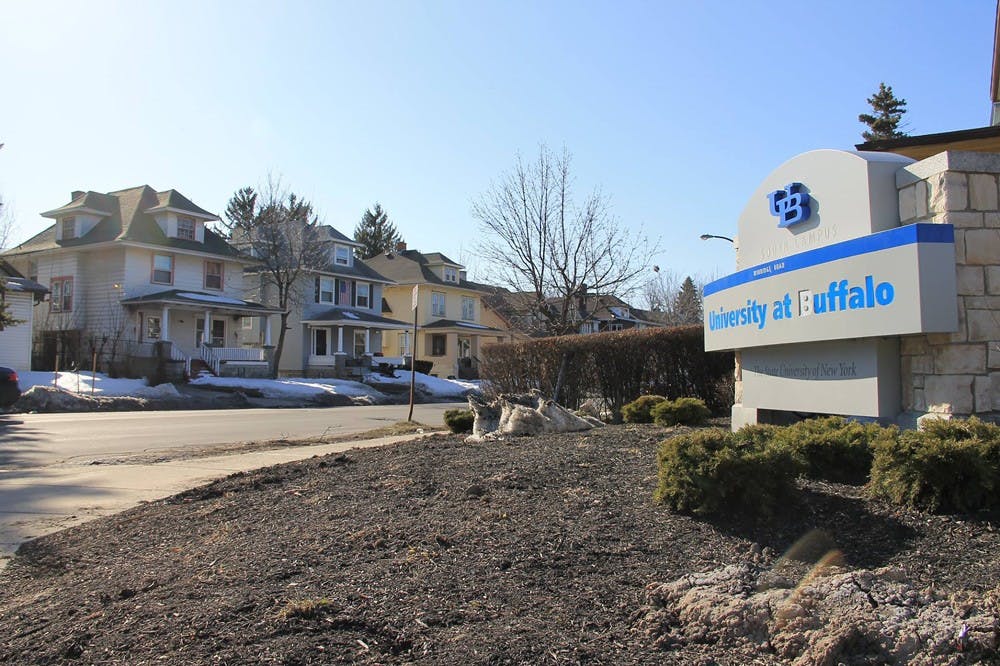When Craig Laudani and his roommates first visited a Stockbridge Avenue apartment near South Campus and found broken tiles, trash on the carpet, a gas canister in a closet upstairs and nails sticking out of the floor, they were assured it would be cleaned up and fixed by the time they moved in in August 2014.
It was not.
“This should have been the first sign that we weren’t dealing with honest landlords,” Laudani said.
The house was not fixed until October. After graduating from UB and moving out in December, Laudani had to make a seven-hour drive back from Long Island to Buffalo and sit in the landlord’s office for three hours just to get his month-overdue security deposit back. And he’s still waiting for a check for an additional month of rent he was incorrectly told to pay.
Laudani had never looked into the background of the property management company, Sarale Management LLC, that he and his roommates rented from before signing the lease. And it’s not an uncommon story for UB students, according to Dan Ryan, director of Off-Campus Student Services.
Ryan said students living in off-campus apartments or houses often face issues with their homes and struggle to get their security deposits back. He said students often don’t look into the property or the landlord before signing the lease.
Ryan and the Office for Off-campus Student Services started a website in September 2013 that only lists properties that have a certificate of occupancy or safety inspection within the last 36 months. He encourages students to only rent from landlords that are willing to have their apartments inspected because he says it’s likely those landlords will be more dependable for repairs and matters such as security deposits. He also warned students against signing a lease before knowing if the apartment is up to code and information about the landlord.
“Otherwise it’s sort of like the wild west out there,” Ryan said. “There’s a lot of landlords who, unfortunately, don’t put a lot of money back into their properties.”
Laudani said he was unaware of UB’s off-campus services during his time at UB. He said he and his roommates had limited choices of where to rent from, as they were only attending UB for the fall semester and needed to sublease. He said a friend who eventually did not end up rooming with them found the Stockbridge Avenue apartment online.
“That was literally the only thing we found,” Laudani said. “We had no other choice. Otherwise we probably wouldn’t have been there.”
Sarale Management did not respond to inquiries made by The Spectrum. The voicemail inbox was also full – a problem Laudani said he ran into regularly.
A housing website run by Student Board I (SBI) does not require the same restrictions for properties as the Off-campus Student Services website, but does label properties that do not have a certificate of occupancy. Student Association President James Ingram said there are currently discussions about improving the website.
Ingram said Ryan’s site has fewer listings than SBI’s because some landlords do not want to pay the certificate of occupancy, which costs $75 and may lead to expensive repairs.
When SBI discovers a house on its site is not up to code, SBI requires the landlord to send a picture of the fixed problem, such as a replaced smoke detector. Ingram has proposed banning a property from the site until it has a certificate of occupancy if it is discovered it is not up to code because landlords could possibly be taking a photo of a different property.
Ryan said students should always visit the apartment before signing the lease. He said some, like international students, are unable to do so because they are out of town when apartments are being snatched up. But even visiting the house does not always guarantee it will be in good condition once a student moves in, according to Ryan.
Apartments can sometimes be damaged between the time a student signs a lease and actually moves in. Ryan said some students sign their lease in March and do not move in until Aug. 15, and “what happens between March and Aug. 15 can be significant.”
Laudani said the issues he and his roommates saw in the apartment when they first visited not only made the apartment unclean, they also made it “unsafe.” Laudani said the landlord who showed them the home assured them it would be fixed by the time they moved in.
Laudani said it took a visit to the Sarale Management office by his parents for the company to send its maintenance man out to the home, and that the issues were not completely fixed until October.
Ryan said landlords often assure their tenants the problems will be fixed by the time they move in to get them to sign the lease.
“You may look at an apartment in March, and the landlord says, ‘Oh I’ll have that fixed, I’ll have that fixed.’ You show up in August, and it’s not fixed yet,” Ryan said.
Laudani and his roommates took photos of the damage. Ryan said students should always do this so the landlords cannot blame students for damage that preceded them as a way to withhold their security deposits.
“If you can demonstrate this problem preceded you, it’s going to be very difficult for the landlord to hold you accountable,” Ryan said.
Even so, Laudani and his roommates had difficulty getting their $1,025 security deposit back.
Their landlord told them that as long as they gave 15 days of notice of their leave and left the house in good shape, they would receive the whole deposit back within 30 days, which would have been Feb. 1, according to Laudani.
Laudani provided The Spectrum with text messages to his landlord inquiring about the security deposit. On Feb. 17, the landlord texted saying the check was in the mail, but Laudani had still not received it by the time he and his mother drove from Long Island to Sarale Management’s office on Feb. 26.
“We said, ‘We’re not leaving until you give us our security deposit,’” Laudani said. “He was just like screwing around on his computer, mingling, and we’re like, ‘We’re not leaving.’ He eventually just called a bunch of people and they gave us our money.”
Ryan encourages students having issues getting their security deposits back to contact SBI legal services that can provide free legal council. He said matters dealing with security deposits would most likely be dealt with in a small claims court.
Laudani and one of his roommates are currently still owed a total of $525 because both paid an additional month’s rent. They said they paid the extra money because they received “insistent emails” from Sarale Management claiming that they did not pay the month of December, but this was a mistake, as Laudani and his roommates had already paid the last month’s rent at the start of the lease.
According to the text messages given to The Spectrum, Sarale Management told Laudani they sent him a check of $525 in the mail on March 17, but Laudani says he has yet to receive it. The landlord said, “‘Stop calling me The check is on the way.’” Laudani said he is willing to take the company to court despite lawyer fees.
“We would rather them be out of money and us break even than us be down $525 and them get away with it. It’s been that frustrating,” he said. “I wouldn’t want anyone to have to deal with this.”
Laudani now calls not researching his former landlords “a mistake,” and said he wishes he had known of UB’s off-campus housing site.
Ryan said knowing information before signing a lease is key, especially because he has seen students deal with conditions such as bed bugs, faulty electricity, doors and windows that do not lock and landlords who don’t return security deposits.
“The list is long, but, unfortunately, the responsiveness of landlords is often very spotty,” Ryan said.
Tom Dinki is a senior news editor and can be contacted at tom.dinki@ubspectrum.com





